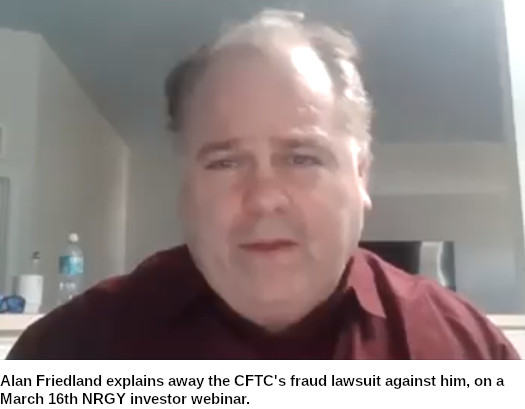Alan Friedland playing fast and loose with fraud evidence
 Alan Friedland (right) appears to be withholding evidence from the CFTC.
Alan Friedland (right) appears to be withholding evidence from the CFTC.
Outstanding requests for production of documents to Friedland date back to August 2020.
After eight months of stuffing around on Friedland’s part, on April 9th the CFTC filed a motion seeking to compel production.
In their motion the CFTC states Friedland was served for production of documents on August 18th, 2020.
Defendants made defective productions in November and December 2020.
Issues highlighted by the CFTC with Friedland’s production are threefold;
- email communications provided by Friedland were “unusable”;
- Friedland responded to a request for specific software, by providing the CFTC with “software that was publicly available on the internet”; and
- he failed to produce specifically requested materials the CFTC believe he possesses
The CFTC’s motion seeks to compel Friedland to remedy these issues.
In addition to produce requested evidence, Friedland also dodged a scheduled April 7th deposition.
The CFTC served notice of the deposition on Friedland on March 11th.
Anticipating a potential excuse for Friedland failing to appear, the CFTC writes;
The CFTC understands that Friedland may argue that he did not appear because he needed time to review newly-produced documents. This argument is without merit.
The CFTC produced 204 additional documents on April 5, 2021.
After conferring with Friedland several times and providing further information about the production, the CFTC ultimately identified four one-page documents from the new production which might be used at Friedland’s deposition.
All four were newly-discovered documents, all created by Friedland, including an email from Friedland appearing to indicate that Friedland would pay a customer to provide a false affidavit in support of his defense in this litigation.
After the CFTC identified the four documents, Friedland still refused to appear.
Counsel indicated Friedland “has a real issue with the four documents you intend to use and believes the other documents provided as well as material we provided in litigation will shed light on the issues.”
Since the CFTC filed its motion, Friedland has agreed to appear for deposition on May 17th.
With respect to production of evidence an order on the CFTC’s April 9th motion remains pending.
Two days after Friedland failed to appear for his original deposition, he appeared on an NRGY webinar to explain away the CFTC’s fraud case against him.

[3:55] It is a fact that during that timeframe I did an ICO during 2017. And the result of it was… it was a great concept but, and I’ll go into what happened on this call.
I also have a number of CompCoin holders that have joined me today.
I do not have one active lawsuit by any CompCoin holders. And the reason is because all of them understand and know that I’ve been honest (and) forthcoming.
They’ve seen the effects that the government has had on stopping CompCoin and I thank these good people. Some of them have lost hundreds of thousands of dollars and yet they steadfastly have supported me, been there and had my back.
And they represent quite frankly over a third of the amount of money that was lost on CompCoin.
The CFTC contends Friedland launched CompCoin and sold the “worthless” coin to investors on the promise of returns.
Friedland represented CompCoin returns were generated via ART, a forex trading bot.
The CFTC claims Friedland marketed CompCoin and ART based on hypothetical trading results (full breakdown of the CFTC’s lawsuit here).
In the NRGY investor webinar, Friedland claims he was “under no obligation to register CompCoin, or the software or myself”.
Friedland states when he reached out to the NFTA about CompCoin, they were “giggly and intrigued”.
[7:54] I got a very positive reception from them initially.
But, I believe it was maybe July or August 2017, the SEC came out and warned about ICOs. This was after we’d completed our ICO, and they did a warning.
And after that time, the regulators who were regulating Fintech Investment Group, keep in mind, not CompCoin, Fintech Investment Group, who proposed CompCoin software trading as a licensed authorized trading program through the NFA, all of a sudden the environment changed.
They botched this up very, very badly.
Friedland goes on to claim US authorities “were not empowered to regulate a cryptocurrency project”.
As I understand it Friedland has funneled a significant number of CompCoin victims into NRGY.
NRGY is a smart-contract Ponzi scheme Friedland covertly launched earlier this year.
Like ART was to CompCoin, Friedland is promising a TradeGenie trading bot to NRGY investors.
Whether NRGY comes up in the CFTC’s lawsuit against Friedland remains to be seen.
Update 27th April 2021 – Alan Friedland has been ordered to hand over the requested evidence.
A separate April 22nd mediation report also reveals mediation proceedings between the parties were unsuccessful.
Update 19th July 2021 – The CFTC has filed for summary judgment against Friedland.


All Alan has to do is get Duane Noble, a really good person and all around great guy, to write a letter of recommendation on Alan’s behalf.
Duane can explain how Alan is a really good person and all around good guy just like him, vouching for Alan’s character, integrity and how legitimate all of Alan’s programs are; and the CFTC has made a major error and mistake in charging Alan.
Who better to write this letter than Duane, who is Alan’s partner in NRGY? After all, Duane can prove that NRGY is legitimate and not a Ponzi or illegal pyramid scheme. Just ask him.
Alan needs to sick Duane on the CFTC and he’ll set them straight, with him being a really good person and all around great guy; and an expert in Cryptocurrencies and trader par excellence’.
Oh wait that was in Brank he was going to be the par excellence’ trader.
I am sure as soon as the CFTC reads Duane’s character letter for Alan, and Duane’s resume, and his being able to prove that NRGY is all legitimate just like CompCoin; they will immediately drop all fraud charges.
Article updated with order directing Friedland to turn over evidence.
It seems that Duane took umbrage at my comments about him in my post above. He left me numerous voice mails advising me that real men talk to each other, not bash someone on the Internet like I am doing to him; and he would never do that to me.
Now what is interesting to me is his use of the term I am bashing him on the Internet and he doesn’t like it. More on this in a moment. But first I want to address what I said about him.
In his voice mails and email messages, and in the couple of telephone calls when we did talk, he kept telling me what a good person he is and what a wonderful guy he is.
In my post I referenced him exactly as he told me he was: a good person and what a wonderful guy he is.
I guess he took umbrage with me that I didn’t mention what a good Christian he is in my post, and how I am a faux Christian. So you can imagine my shock and surprise that such a good Christian would leave me voice mails laced with profanities and threats of bodily harm.
Since you seem clueless as to what constitutes bashing, as my public service I am going to enlighten you about the definition of “bashing.”
The dictionary defines to Bash, and I quote:
So much for me and others bashing you publicly on the Internet. Glad I could clear that up for you.
You promote on the Internet, you defend your program and yourself on the Internet. Real Men have a discussion out in the open and not hide behind a telephone. Let the readers determine who they want to believe.
PLS DELETE THIS IM IM HIS 9 YEAR OLD CHILD IT MAKES ME FELL UNCOFTERPLE
Hi Ally,
While I’m sorry to hear your father’s fraud charges makes you feel uncomfortable, deleting coverage of the case won’t make it go away.
Such to the extent you can, I suggest sitting down with the old man and discussing the case.
The under-10 readership of BehindMLM must have just gone up by infinity percent. Last time I checked Oz didn’t advertise on Roblox or Club Penguin.
“Uncofterple” indeed. Nice try Alan, sorry, “Ally”.
If I was going to pretend to be a 9 year old girl (not creepy at all) I’d at least pick a handle that a 9 year old girl might use, e.g. Princess Unicorn Sparkles.
Next time you’re trying this Alan, a helpful hint: 9 year olds with average writing ability use simple words and spell all of them as they sound. They don’t use perfect spelling and then pull a mangled pentasyllable out of nowhere. E.g. “plees deleet this it makes me feel bad”.
Fortunately, it was a pretty clear (albeit poor) attempt at deception, so no divide-by-zero functions throwing a NaN at us for the New Year.
Good analysis, Mal.
When I saw the post I immediately thought it was Alan trying to trick everyone into taking down the post pretending to be his daughter.
The second thought I had was it is something that Duane Noble would try as well.